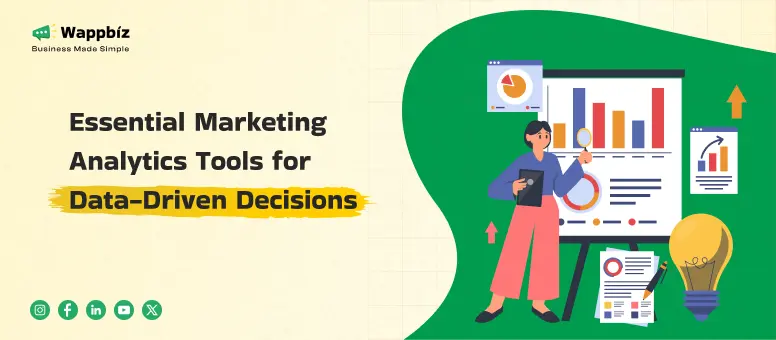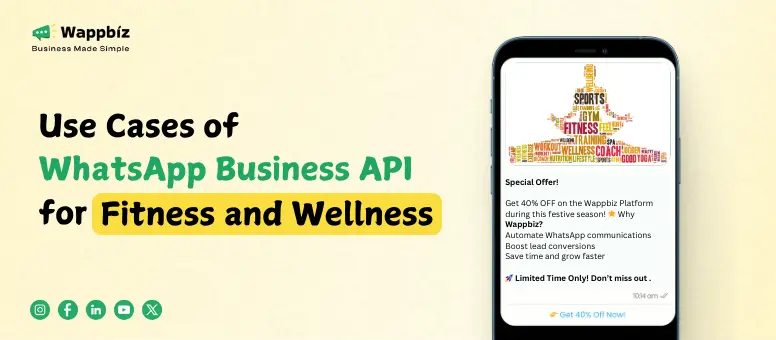In today’s data-driven world, businesses need to go beyond traditional marketing methods to stay competitive. Marketing analytics tools have become essential for understanding customer behavior, optimizing campaigns, and maximizing ROI. These tools provide invaluable insights into what works and what doesn’t, helping businesses make informed decisions, allocate resources efficiently, and identify growth opportunities.
Whether you’re a small startup or a large enterprise, harnessing the power of marketing analytics can transform your marketing strategy, drive revenue, and propel your business to new heights. In this blog, we’ll explore the top marketing analytics tools available, their key features, and how they can benefit your business.
Table of Contents
- What is a Marketing Analytics Tool?
- What are the 4 types of Marketing Analytics?
- What are the 4 Steps of Marketing Analysis?
- Top 30 Marketing Analytics Tools to Elevate Your Campaigns
- 1. Google Analytics
- 2. HubSpot
- 3. SEMrush
- 4. WappBiz WhatsApp Analytics
- 5. Adobe Analytics
- 6. Moz Pro
- 7. Hootsuite Analytics
- 8. Tableau
- 9. KISSmetrics
- 10. Mailchimp Analytics
- 11. BuzzSumo
- 12. Crazy Egg
- 13. ClickFunnels
- 14. Mixpanel
- 15. Ahrefs
- 16. Google Data Studio
- 17. Marketo
- 18. Hotjar
- 19. IBM Watson Analytics
- 20. Sprout Social
- 21. Buffer Analytics
- 22. Qlik Sense
- 23. Sendinblue
- 24. Optimizely
- 25. Zoho Analytics
- 26. Unbounce
- 27. Bitly
- 28. Google Tag Manager
- 29. Segment
- 30. Woopra
- What are marketing analytics tools?
- Which marketing analytics tool is best for beginners?
- How do marketing analytics tools work?
- What should I look for when choosing a marketing analytics tool?
- How can marketing analytics tools improve ROI?
- Are there free marketing analytics tools available?
- How do marketing analytics tools help with competitor analysis?
- How to Choose the Right Marketing Analytics Tools for Marketing Strategy?
What is a Marketing Analytics Tool?
A marketing analytics tool is software designed to gather, monitor, and analyze marketing data, enabling businesses to measure campaign performance and gain insights into customer behavior. It integrates data from multiple sources—such as websites, social media, email, and paid ads—offering a comprehensive view of marketing efforts. By visualizing information through interactive dashboards and detailed reports, these tools allow marketers to track key metrics, identify trends, and optimize strategies. They also assist in making data-driven decisions and predicting future outcomes, ensuring marketing initiatives are effective, ROI-driven, and in sync with business objectives.
What are the 4 types of Marketing Analytics?
The four types of marketing analytics are:
- Descriptive Analytics: Focuses on historical data to explain what happened in past marketing efforts. It summarizes past trends and outcomes, providing a clear picture of campaign performance and customer behavior over time.
- Diagnostic Analytics: Examines data to uncover the reasons behind specific marketing results. It digs deeper into “why” something occurred, identifying patterns and factors that influenced success or underperformance.
- Predictive Analytics: Utilizes current and historical data to forecast future marketing trends and outcomes. By analyzing patterns, it helps businesses anticipate customer behavior and campaign performance, enabling them to prepare and strategize accordingly.
- Prescriptive Analytics: suggests actionable steps based on data insights to enhance and optimize future marketing efforts. It not only predicts outcomes but also provides recommendations on how to achieve the best possible results.
What are the 4 Steps of Marketing Analysis?
The four steps of marketing analysis are:
- Data Collection: Collect data from multiple sources, such as sales reports, web analytics, customer feedback, and social media interactions. This step ensures you have a comprehensive set of information to work with.
- Data Analysis: Examine the gathered data to uncover trends, patterns, and customer behaviors. This analysis helps you understand what’s working and where adjustments may be needed.
- Insight Generation: Transform the analyzed data into meaningful insights that reveal business strengths, weaknesses, and growth opportunities. These insights are essential for understanding how to enhance your marketing efforts.
- Strategy Development: Utilize the insights to develop or refine marketing strategies. The goal is to maximize ROI, enhance campaign effectiveness, and better align marketing activities with business objectives.
Top 30 Marketing Analytics Tools to Elevate Your Campaigns
In today’s digital-first world, having access to data is crucial, but data alone won’t make your marketing successful. The real power lies in how you interpret and leverage that data to refine strategies, improve engagement, and drive conversions. That’s where marketing analytics tools come in—they transform raw information into actionable insights, guiding businesses toward smarter, more effective campaigns.
Below are the top 30 marketing analytics tools that can elevate your strategy and transform how you engage with your audience.
1. Google Analytics
Google Analytics is one of the most popular and powerful tools for tracking and understanding website performance. It helps you monitor everything from where your visitors are coming from (like social media, organic search, or paid ads) to what actions they take on your site (such as viewing pages, clicking buttons, or making purchases). With Google Analytics, you can analyze the behavior of different audience segments, track your sales funnels, and identify areas for improvement.
By understanding metrics like bounce rates, session duration, and conversion rates, you can fine-tune your marketing campaigns and website content to ensure they effectively engage your audience and lead to conversions.
2. HubSpot
HubSpot is an all-in-one platform that combines CRM, marketing automation, and analytics tools into one cohesive system. It’s designed to track various aspects of your marketing efforts, including lead generation, email marketing, social media campaigns, and website performance. HubSpot’s analytics dashboard gives you a clear view of your marketing funnel, showing where leads come from and how they progress through your sales pipeline.
This integration allows businesses to see the big picture and understand which campaigns drive the most value, ultimately helping you tailor your marketing strategies to attract and convert more leads.
3. SEMrush
SEMrush is a robust digital marketing tool specializing in SEO, content marketing, and PPC advertising. It provides insights into keyword performance, website traffic, and competitor strategies, allowing businesses to optimize their online visibility. With SEMrush, you can track your keyword rankings over time, see how your website compares to competitors, and identify opportunities for improving your content and paid campaigns.
Its site audit feature also highlights technical issues affecting SEO, helping you improve website health for better search engine performance. It’s an all-in-one tool for anyone serious about growing organic and paid traffic.
4. WappBiz WhatsApp Analytics
WappBiz WhatsApp Analytics is a powerful marketing analytics tool designed to maximize your business’s WhatsApp marketing potential. It provides comprehensive insights into customer interactions, campaign performance, and message engagement rates, enabling businesses to refine their strategies and improve ROI. With features like real-time tracking, message delivery analysis, and user behavior monitoring, WappBiz helps businesses understand what resonates with their audience.
It also offers segmentation options to target specific customer groups, ensuring personalized and effective communication. By leveraging WappBiz WhatsApp Analytics, businesses can make data-driven decisions, enhance customer engagement, and drive growth through optimized WhatsApp marketing campaigns.
5. Adobe Analytics
Adobe Analytics is designed for large enterprises that need a deep understanding of their customer interactions across digital platforms. It goes beyond basic metrics, offering advanced segmentation and customization to dig into user behaviors and patterns. The tool integrates seamlessly with other Adobe products, allowing businesses to combine data from different marketing channels—like social media, email, and web—to create a unified view of their campaigns.
This capability helps brands understand customer journeys in great detail, from the first touchpoint to conversion, so they can create personalized experiences that drive results.
6. Moz Pro
Moz Pro is an SEO-focused tool that helps businesses enhance their search engine presence. It provides insights into search rankings, keyword performance, and backlinks, which are crucial for improving your site’s visibility on search engines like Google. Moz Pro’s keyword explorer allows you to research and prioritize the best keywords for your business, while the site audit tool identifies technical SEO issues and suggests improvements.
Additionally, its rank tracking feature keeps you informed of how your keywords perform over time, enabling you to adjust your SEO strategy as needed for better results.
7. Hootsuite Analytics
Hootsuite is widely known for its social media management capabilities, and its analytics feature offers detailed insights into how your social media campaigns perform. It allows you to track metrics like engagement rates (likes, shares, comments), audience growth, and overall post reach across multiple platforms (Facebook, Instagram, Twitter, etc.) in one place.
This helps you understand what type of content resonates most with your audience, enabling you to adjust your social media strategy to increase engagement and conversions. Hootsuite also offers scheduling and monitoring features, making it an all-in-one solution for managing and analyzing social media marketing.
8. Tableau
Tableau is a leading data visualization tool that helps businesses transform complex datasets into interactive, visually appealing dashboards. For marketers, Tableau’s ability to visualize data from various marketing channels, such as social media, email, and web analytics, allows you to see patterns and trends that might otherwise go unnoticed.
Whether you’re looking to present a monthly performance report to your team or analyze customer behavior, Tableau provides the tools to create compelling visuals that simplify the data interpretation process. It’s ideal for businesses that want to make data-driven decisions quickly and effectively.
9. KISSmetrics
KISSmetrics focuses on tracking user behavior and engagement throughout the customer journey, providing a detailed look at how customers interact with your website or app. It offers analytics on conversion rates, customer retention, and user actions, allowing businesses to understand what drives user behavior.
By tracking key touchpoints, KISSmetrics helps you identify where users drop off in the sales funnel and which marketing tactics are most effective at driving conversions. This insight is invaluable for optimizing the user experience and boosting customer loyalty.
10. Mailchimp Analytics
Mailchimp is a widely used email marketing platform that also provides comprehensive analytics features. It tracks key metrics like open rates, click-through rates (CTR), bounce rates, and subscriber growth, enabling you to evaluate the effectiveness of your email campaigns. With these insights, you can determine which subject lines, content types, and CTAs (call-to-actions) resonate best with your audience.
Mailchimp also allows A/B testing, so you can test different versions of your emails to optimize for higher engagement and better performance.
11. BuzzSumo
BuzzSumo is a content marketing tool that identifies trending topics and top-performing content within your niche. It shows which articles, blog posts, and social media posts generate the most engagement, providing insights into the type of content that resonates with your target audience.
BuzzSumo also helps identify influencers who can amplify your content’s reach, making it a valuable tool for developing effective content strategies and outreach campaigns that drive traffic and engagement.
12. Crazy Egg
Crazy Egg specializes in heatmap analytics, showing exactly where users click, scroll, and spend time on your website. These visualizations give marketers a clear understanding of user behavior, helping them optimize website elements like navigation, CTA buttons, and page layout for better engagement and conversions.
Crazy Egg’s session recording feature also provides a first-hand view of user interactions, enabling businesses to identify and fix pain points that may be preventing users from completing desired actions.
13. ClickFunnels
ClickFunnels is a tool for building and optimizing sales funnels. It combines sales funnel creation with analytics, allowing businesses to track user behavior at each stage of the funnel—from landing page visits to conversions.
By identifying which steps in the funnel work well and which ones cause drop-offs, ClickFunnels helps marketers refine their sales processes, resulting in higher conversion rates and a more streamlined sales journey for customers.
14. Mixpanel
Mixpanel focuses on user behavior analytics, especially for web and mobile apps. It tracks user interactions in real-time, providing insights into how people engage with your product, which features they use the most, and what paths they take before converting.
Mixpanel’s detailed reports help businesses understand user journeys, allowing them to create targeted marketing campaigns and product improvements based on actual user behavior rather than assumptions.
15. Ahrefs
Ahrefs is a comprehensive SEO and digital marketing tool that specializes in backlink analysis and keyword tracking. It provides insights into competitor SEO strategies, keyword rankings, and content performance, helping businesses boost their search engine presence.
Ahrefs’ site audit feature identifies SEO issues and suggests ways to optimize website performance. For marketers looking to improve organic search rankings, Ahrefs is an indispensable tool for keyword research, link building, and content optimization.
16. Google Data Studio
Google Data Studio is a free reporting and data visualization tool that allows marketers to create customized dashboards using data from various sources like Google Analytics, Google Ads, and more.
It helps turn raw data into actionable insights with clear, visually appealing reports. This makes it easier for businesses to share performance metrics with their team, visualize campaign outcomes, and make data-driven decisions.
17. Marketo
Marketo is a robust marketing automation platform that also offers in-depth analytics. It tracks the performance of email campaigns, lead generation efforts, and marketing ROI, providing marketers with the data needed to optimize their campaigns.
Marketo’s integration capabilities with CRM systems make it a great choice for businesses looking to automate and measure their marketing efforts, enabling them to scale their strategies effectively.
18. Hotjar
Hotjar is a user behavior and feedback tool that combines heatmaps, session recordings, and surveys to give marketers a comprehensive understanding of how users interact with their websites. It shows where users click, scroll, and get stuck, providing insights for improving site navigation and design.
Hotjar’s feedback features also allow you to collect user opinions directly, making it a valuable tool for enhancing the user experience and increasing conversions.
19. IBM Watson Analytics
IBM Watson Analytics uses AI to provide advanced marketing insights, such as trend analysis, customer segmentation, and behavior prediction. By leveraging machine learning, it identifies patterns in marketing data, enabling businesses to create targeted campaigns that anticipate customer needs.
For companies that want to use AI to optimize their marketing efforts, IBM Watson Analytics offers sophisticated tools for turning data into strategic actions.
20. Sprout Social
Sprout Social combines social media management with powerful analytics features. It provides detailed reports on engagement metrics, audience demographics, and content performance across various social media platforms. The tool allows marketers to monitor the effectiveness of different posts, helping them identify what type of content works best and when their audience is most active.
Sprout Social’s reporting features also allow you to track trends over time, giving you the insights needed to refine your social media strategy for maximum impact and brand visibility.
21. Buffer Analytics
Buffer Analytics is ideal for businesses focused on managing and tracking their social media performance across multiple platforms. With Buffer, you can monitor audience engagement metrics like likes, shares, comments, and clicks, all in one place.
It also offers insights into audience growth and helps identify which content types are performing best, enabling you to refine your social media strategy based on real data. By analyzing trends over time, Buffer Analytics ensures that you can adjust your social campaigns for maximum impact and build a stronger social presence.
22. Qlik Sense
Qlik Sense is a powerful business intelligence (BI) and data visualization tool that enables marketers to create interactive dashboards from complex data sources. It’s designed for companies that want to go beyond basic metrics and need a tool that can analyze data across various marketing channels in a visually appealing format.
Qlik Sense allows you to integrate data from social media, email marketing, web analytics, and more into a unified view. The tool’s drag-and-drop interface makes it easy for users to build detailed dashboards, helping businesses see patterns and trends that can guide strategic marketing decisions.
23. Sendinblue
Sendinblue is an all-in-one marketing platform that focuses on email marketing, SMS campaigns, and marketing automation. It provides comprehensive analytics, tracking open rates, click-through rates, conversion rates, and user engagement. Sendinblue’s detailed reporting helps businesses understand the effectiveness of their email campaigns, enabling marketers to adjust their messaging, timing, and audience segmentation for better results.
Additionally, it offers A/B testing capabilities, so you can experiment with different elements of your emails to optimize engagement and conversions, all while ensuring that your communication strategy remains effective and data-driven.
24. Optimizely
Optimizely is a leading tool for website optimization and A/B testing, helping businesses refine their web experiences to boost conversions. With Optimizely, marketers can experiment with different website elements—such as headlines, images, CTA buttons, and overall layout—and analyze which versions generate the highest engagement and conversion rates.
This allows for continuous optimization based on user behavior and preferences. By using Optimizely’s analytics and testing features, businesses can create data-driven, user-centric web experiences that lead to higher customer satisfaction and improved business outcomes.
25. Zoho Analytics
Zoho Analytics is a comprehensive business and marketing analytics platform that offers customizable reports and data visualizations. It integrates with various marketing and CRM platforms, allowing you to track a wide range of metrics, including social media engagement, email performance, website traffic, and sales.
Zoho’s ability to merge data from multiple sources helps create a holistic view of your marketing campaigns. Marketers can easily set up dashboards and automate reports, ensuring that data is continuously monitored and strategies are adapted based on real-time insights. It’s a versatile tool for businesses seeking to centralize and analyze their marketing efforts.
26. Unbounce
Unbounce specializes in landing page creation and optimization. It provides analytics on conversion rates, user engagement, and the performance of different landing page elements. With Unbounce, businesses can quickly build and test landing pages without coding, making it easy to run A/B tests to determine which designs and content perform best.
By analyzing the data from these tests, marketers can refine their landing pages to maximize lead generation and conversions, ensuring that their campaigns are as effective as possible. The tool is perfect for businesses aiming to optimize their lead capture processes and improve overall marketing performance.
27. Bitly
Bitly is a URL shortening and link management tool that also offers robust analytics on link performance. Beyond just shortening URLs, Bitly provides detailed metrics such as click-through rates, geographic locations of users, and referral sources, helping businesses understand where their traffic comes from.
By tracking how users interact with links across campaigns, marketers can optimize their content strategy, ensuring they focus on the channels and formats that generate the most engagement. It’s an essential tool for monitoring the effectiveness of campaigns, especially in social media and email marketing.
28. Google Tag Manager
Google Tag Manager (GTM) is a powerful tool that works alongside Google Analytics to provide deeper insights into user behavior and marketing campaign performance. GTM allows marketers to create and manage tags—small pieces of code that track various actions on your website, such as button clicks, form submissions, and page views—without needing to modify the website’s code directly.
This flexibility enables marketers to implement advanced tracking and quickly gather data to analyze how users interact with different elements of the site. By using GTM, businesses can better understand customer journeys and optimize their digital strategies accordingly.
29. Segment
Segment is a customer data platform (CDP) that helps businesses collect, unify, and manage data from various sources like websites, mobile apps, and CRM systems. By consolidating data into one platform, Segment enables marketers to track user behavior across different channels and create a cohesive view of the customer journey.
This unified data allows businesses to better understand how customers interact with their brand and optimize their marketing efforts based on consistent and accurate information. Segment is ideal for businesses looking to improve personalization and tailor their marketing strategies to individual customer needs, ensuring a seamless and effective customer experience.
30. Woopra
Woopra provides real-time analytics on user behavior and engagement, focusing on customer journeys and lifecycle tracking. It offers insights into how users move through different stages of the funnel, from awareness to conversion and retention. Woopra’s ability to segment users based on behavior and demographic information helps marketers understand what drives each customer segment.
This information is crucial for tailoring marketing strategies, improving customer retention, and enhancing the user experience. By monitoring user activity in real time, businesses can quickly adjust their marketing efforts to maximize engagement and conversions, making Woopra a powerful tool for ongoing campaign optimization.
Conclusion
The right marketing analytics tools empower businesses to transform data into insights, enabling smarter decisions and better campaign outcomes. Whether your focus is on SEO, social media, email marketing, or overall user experience, these tools provide the capabilities needed to elevate your strategy. Explore these options and find the ones that best align with your marketing goals to take your campaigns—and your business—to the next level.
Remember, it’s not just about gathering data; it’s about making the most of it. Let the right tools guide you to smarter, more effective marketing.
FAQs
What are marketing analytics tools?
Marketing analytics tools are software platforms designed to track, measure, and analyze marketing performance data. They provide insights into customer behavior, campaign effectiveness, and return on investment (ROI), with examples including Google Analytics, SEMrush, and HubSpot.
Which marketing analytics tool is best for beginners?
Google Analytics and HubSpot are excellent options for beginners due to their intuitive interfaces, availability of free versions, and comprehensive tutorials that make it easy to start tracking and analyzing marketing data.
How do marketing analytics tools work?
These tools collect data from various marketing channels like websites, social media, and email campaigns. They then process this data and present it through visual dashboards and detailed reports, offering insights into campaign performance, audience engagement, and conversion metrics.
What should I look for when choosing a marketing analytics tool?
When selecting a tool, consider features like data visualization, multi-channel tracking, CRM integration, real-time reporting, and ease of use. For businesses seeking in-depth insights, platforms like Tableau and Adobe Analytics offer extensive capabilities.
How can marketing analytics tools improve ROI?
By monitoring customer interactions and campaign outcomes, these tools help businesses identify which strategies work best, optimize marketing expenditures, and allocate resources more effectively, ultimately enhancing ROI.
Are there free marketing analytics tools available?
Absolutely. Tools such as Google Analytics, Mailchimp Analytics, and Bitly offer free versions that provide essential analytics features, making them great for small businesses and startups looking to track their marketing performance without cost.
How do marketing analytics tools help with competitor analysis?
Platforms like Ahrefs and SEMrush include features for competitor analysis, offering insights into keyword usage, backlink strategies, and content performance, helping businesses gain a competitive advantage through data-driven strategies.
How to Choose the Right Marketing Analytics Tools for Marketing Strategy?
To choose the right marketing analytics tool, define your goals, evaluate features like integration and ease of use, consider your team’s skills, and match it to your budget to ensure it aligns with your strategy.
Author
-

With over 14 years of experience, Ghanshyam Sharma leads Augment Works, specializing in Augmented Reality (AR), Virtual Reality (VR), and the Metaverse. A WhatsApp marketing expert, he also oversees content marketing strategies, aligning technology with business goals to drive growth and innovation.
View all posts








